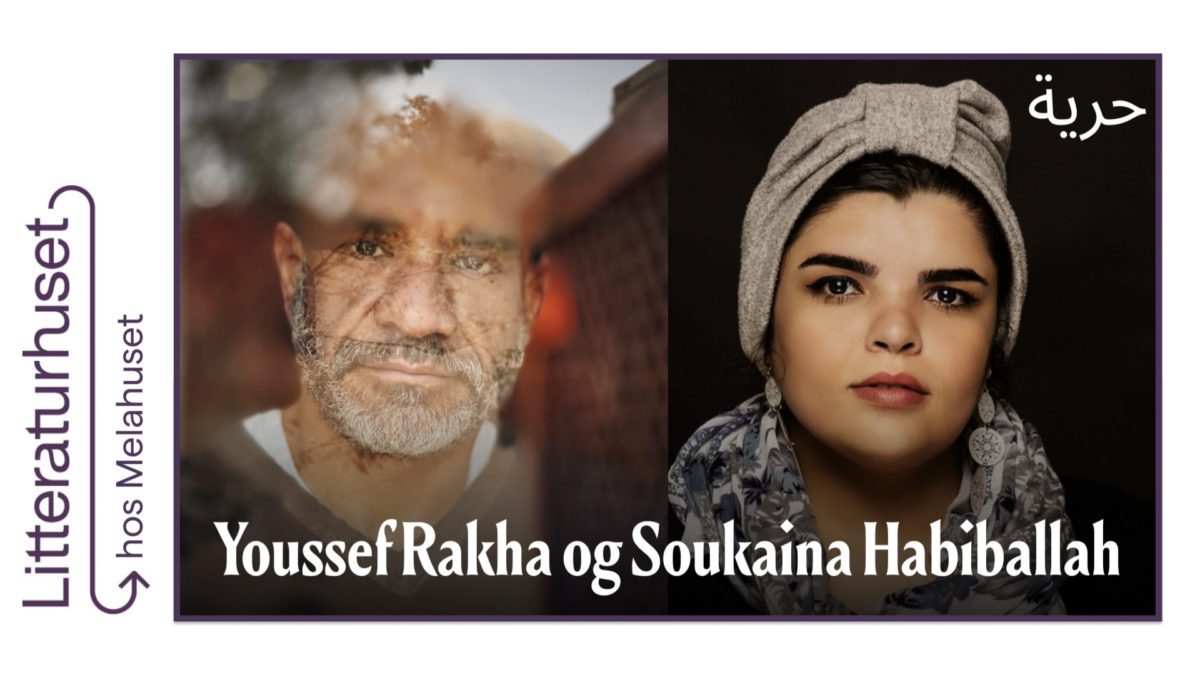- This event has already taken place.

Writing a Revolution: Youssef Rakha and Soukaina Habiballah (event in Arabic)
Thursday, May 8
- Melahuset
- 18:00
Writing a Revolution: Youssef Rakha and Soukaina Habiballah. In conversation with Selma Benmalek on literature, language, and liberation.
The Writing Revolution: ''
يوسف رخا وسكينة حبيب اللة حوار مع سلمى بنمالك حول العدب, اللغة والتحر
ه
Thursday, May 8, Melahuset
At 6:30 p.m.
Free admission
The conversation will be in Arabic.
خميس, 8 مايو, في ميلاهوسة
فية والنصف مساد
Both Egyptian Youssef Rakha and Moroccan Soukaina Habiballah explore the current situation and recent past of their home countries through literature: In Rakha's The Dissenters we follow the life of an Egyptian woman from the 1950s and through the revolution in 2011, and the different phases of her life are mirrored in the society that is changing around her.
Habiballah's short story collection Maybe Tomorrow depicts defining moments in the lives of twelve women in contemporary Morocco. All attempt to shape their own destiny, but not all succeed.
What inspires Rakha and Habiballah when they write? What stories are worth writing, and who should write them?
As Habiballah has pointed out, the feminine form of the Arabic word for “writer,” “katiba,” is not used to refer to writing, but rather to mean “secretary.” What does this mean for the role of the female writer?
Rakha, for his part, has written his first novel in English with The Dissenters . Why did he move away from Arabic and towards English for this book? And how are his books read in the West compared to in Egypt?
Youssef Rakha was selected by the Hay Festival in 2009 as one of the best Arab writers under 40. He is the author of several critically acclaimed publications, including The Crocodiles trilogy and The Book of the Sultan's Seal.
Soukaina Habiballah is the award-winning author of four poetry collections, a short story collection, a novel, and a play.
Now the two meet Selma Benmalek , board member of Masahat for Arab Culture in Exile, for a conversation about language, literature and liberation.
The conversation will be in Arabic.
///
يستكشف كل من المصري يوسف رخا والمغربية سكينة حبيب الله the present situation والماضي قريب لمجمعتاتحما من ذلك يكوتر: في كتاب رخا "ذا ديسانترس", هد نتابع هيات هامت من خمسينيات ألي ثورة 2011, هد تنتنفت تنفس هايتا على عالم من حورها هذه يترح As for the book “ربما غداً” لسكينة حبيب الله, a collection of short stories presents crucial moments in the life of two dozen women in modern Morocco, where they are all together to shape their destiny, but they do not succeed in that
ما الدهي يلهمهما للكتابة? What are the stories that deserve to be seen? And who should write it?
كما عشارت حبيب الله: معنث الكلمة العربية لكتاب, هي «كتابة», لا شير عبدًا على فيل الكرتيرة, بل تعليق «سكرتيرة». What is meant by that for the author's role?
On the other hand, he wrote his first narration in English with the title ” ذا ديسانترس “. Why did you choose English instead of Arabic? How do you read his books and stories in the West compared to Egypt?
"تم اختبار يوسف رخا تمعلم افضل الكتاب العرب تحت سن العربين في حجمة "هاي" عام 2009. وهو الموصف الروايات وشعر نالت استحسان النقاد, مسل "التماسيح", "باولو", و"كتاب الطغرى
سكينة حبيب الله is an award-winning author for four collections of poetry, a novel, a collection of short stories, and a play titled "Nini YA MOMO"
سينزما على يوسف رخا وسكينة Habib Allah, member of the Council of Management of the Foundation “مصاحة للتحقف العربية في المنفى” سلمى بنمالك, في ناقش حول عدب واللغة والتحرر
The dialogue will be in Arabic



